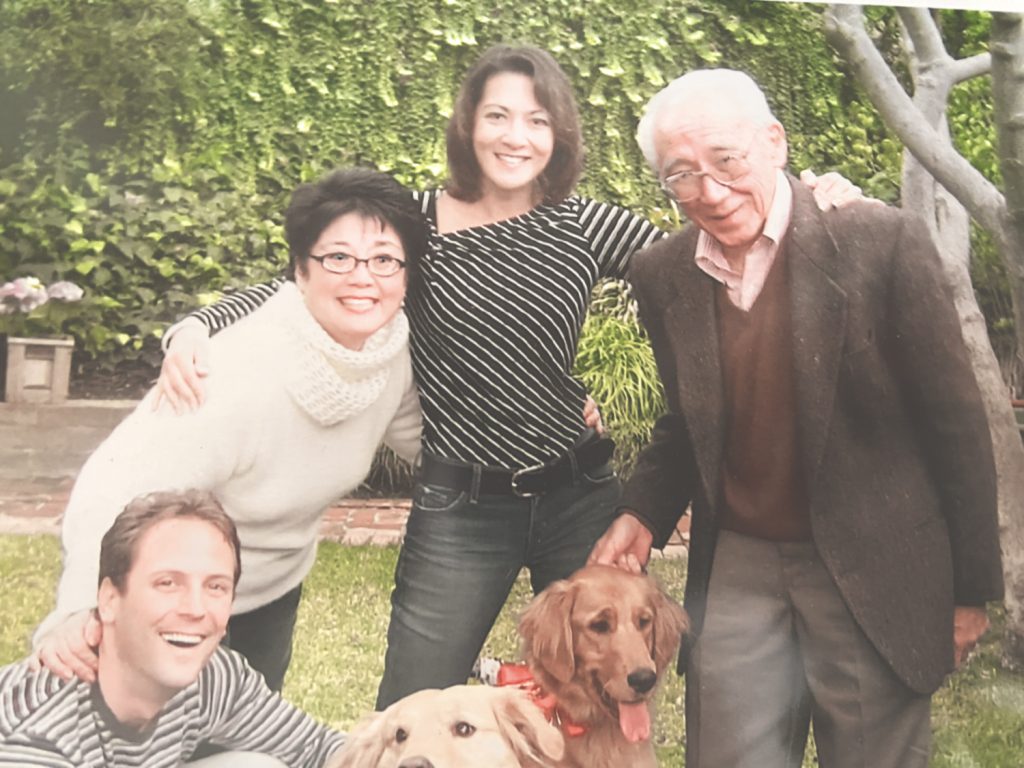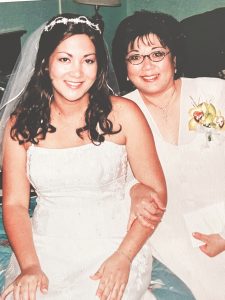
Marsha Aizumi
I met Pam Tajima Praeger through my work with Japanese for Biden. I connected with her because I had never done phone banking, and she seemed comfortable and experienced. I was nervous to call people I did not know in states like Georgia, Pennsylvania and Arizona, asking them to vote for Joe Biden. So, I reached out to Pam for support, and she graciously talked me through how to phone bank.
We found out we had some things in common. I lived in Pasadena, Calif., and that was her hometown. She lived in Washington, and I had many friends in Seattle. As I got to know Pam, she shared that she had lost her daughter, Tara, 15 years ago to cancer.
Recently, she told me she was coming to Southern California to visit some family members and also see her daughter’s husband, who has since remarried. What I didn’t hear in her voice was sadness when she talked about her daughter.
And so I delicately asked, if it wasn’t too painful, if she would allow me to interview her to talk about her journey with Tara. She said talking about Tara kept her daughter alive in her life, and so Pam graciously agreed to share her story.
Here is how her journey began and unfolded:

Pictured (from left) are Scott, Pam, Tara and Grandpa Ted Tajima. (Photo: Courtesy of Pam Tajima Praeger)
Tara and I were alone in the hospital when her neurosurgeon came in to see her; it was three long days after the biopsy of the large tumor she had removed from her brain. We were shocked and scared when we were told that she had medulloblastoma, an extremely rare and fast-growing cancer about which little was known, especially for treating someone of her age.
We were very close before her diagnosis, perhaps beyond a positive mother-daughter bond as this closeness evolved through her support during my divorce and my own cancer scare.
She possessed a strong and loving personality, exhibiting the best qualities of both her dad and me. She was Hapa, looked very Asian, and we both loved Japan, ice hockey and travel.
I don’t know if it was denial and a form of shikata ga nai, which our family interpreted as “don’t dwell on something, but move on,” however, none of us fixated on the frightening aspects of her cancer and what it might mean for the future.
Yes, there were times I cried and wondered why this was happening to us, but we focused our energies on being optimistic and searching for the best treatment. I asked for the cause of the cancer, and learning it was not something that we did wrong, we put all of our heart and energy in moving forward.

Days from completing radiation treatment, Tara gets married. Here she is with her mom, Pam. (Photo: Courtesy of Pam Tajima Praeger)
Guilt interferes with positive action. This diagnosis came a little over two months before her upcoming marriage to Scott, on May 26, 2002. Besides treatment, our focus was on the wedding planning, which Tara struggled to be engaged in through debilitating daily radiation to her brain and spine.
We joked that while many mothers and daughters had tension during wedding planning, we did not. Despite tears, comfort and care were always on our minds.
Both of my parents, Nisei cancer survivors, were extremely supportive of Tara and all of us, as were many friends, our work colleagues and extended family. Japanese Americans are generous and rally especially for their own.
Tara and my journey from diagnosis to her transition from this world lasted a little over four years in different stages of living during the return of the medulloblastoma.
In response to how I moved forward after I lost her, I don’t think I lost her. . . she only transitioned from what I knew. I am aware that I did have a loss, but I always remember that she told her husband and me that we had to continue on.
We promised her, and she even told us what we might do. I was raised to believe that even though things seemed tough, my family and I always had advantages and there were those in worse situations.
Perhaps those beliefs were a combination of a Christian-, Japanese- and Buddhist-influenced upbringing. I do know that the belief was definitely part of me, when Tara passed away and in other times when I start to feel sorry for myself.
I remember from my teens the phrase that if I was not part of the solution, I was part of the problem. That thought continues to inspire me. If we could not guarantee that she would get well and be cancer free, we had to use our knowledge and heart to plan during Tara’s demise what served her the best.
Immediately after another tumor and cancer were detected, Tara started writing an autobiography. She wrote solidly for five months until her medical team gave her a few months to live.
Her book, which she was not able to finish, and online journaling showed her will to give all she could to her hundreds of supporters. When Tara could no longer type, she would dictate her upbeat attitude and gratitude in response to others. When she could no longer speak, I kept her presence alive, sharing her last days.
Being determined to always remember Tara and be buoyed by those memories, I intentionally celebrate her birth and her physical death by sharing our story through photos, writings, scrapbooks and via social media.
I have stayed connected with her good friends and her husband, who is wonderfully still in my life. Many of the donations I make focus on honoring and remembering her and what she represented. I do the same in memorials for others.
Writing about our relationship and not her diagnosis has been the focus of my memories of Tara. Today and always, she remains so much a part of who I am. Plus, a pendant, paver, curb and park sign reading, “Tara, Always in our Hearts” are continual reminders of her beautiful life.
I am so grateful for Pam and how she has been willing to share the hardest thing a mother has to face. I appreciate how she has kept Tara’s memory alive and the strength she has received from her own personal beliefs, her child and her upbringing.
And like so many mothers I have met along the way who have faced challenging situations, Pam has led with love and today still radiates love in all she is doing. Tara, you would be so proud. . . .
And when one of us is gone,
And one of us is left to carry on,
Then remembering will have to do,
Our memories alone will get us through
Think about the days of me and you,
Of you and me against the world.
— Recorded by Helen Reddy
Marsha Aizumi is an advocate in the LGBT community and author of the book “Two Spirits, One Heart: A Mother, Her Transgender Son and Their Journey to Love and Acceptance.”



